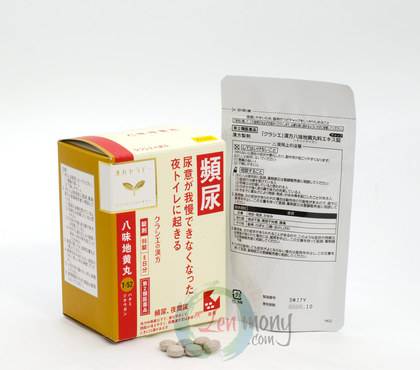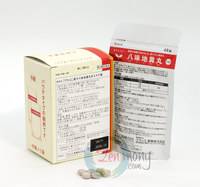Cracie (八味地黄丸) Hachi-mi-ji-o-gan for frequent urination (pollakiuria) and nocturia
Hachimijiogan - Eight-Ingredient Pill with Rehmannia
Often working for middle aged people’s complaints regarding their legs, Hachimijiogan is a supplementary ingredient containing Rehmannia and Processed Aconite Root. Used by middle aged people and older for urination disorder and feelings of weakness in the legs, coldness, numbness, pain, decreased libido, impotence, as well as renal ischemia, a term in Kampo medicine. Stomach may feel heavy due to Hachimijiogan containing Rehmannia Root. Taking after meals reduces these effects on the stomach.
Functional components:
- Rehmannia (Rehmannia glutinosa)
A perennial plant of the Scrophulariaceae family whose roots are used. There is fresh Rehmannia, as well as dried, and steam-dried. Dried Rehmannia is used as a medicine to cool the body, effective for fevers and dry mouth. Steam-dried Rehmannia is a warming medicine, effective for anemia, night sweats and dizziness. If you have an upset stomach, take Rehmannia orally after eating.
- Japanese cornel (Cornus officinalis)
Cultivated in China, South Korea, Japan and elsewhere. The fruit are called 'cornelian cherries' and are used as an analeptic, an astringent, and as a hemostatic medicine. Contains iridoid glucosides.
- Asian water plantain (Alisma orientale)
Distributed across northern Kyushu, Hokkaido, Korea, east Siberia, northeast China and Mongolia, it is a perennial plant that grows in wetlands and shallow waters. It is cultivated as a medicinal plant in Hokkaido and Nagano Prefecture. The root stalks are called 'alisma tubers', and in Chinese medicine are added to many prescriptions to treat diuresis and thirst, including being used to reduce urination, as well as address frequent urination, gastric indigestion, dry mouth, and dizziness.
- Poria (Poria cocos)
This is the sclerotium of the Poria cocos mushroom of the Polyporaceae family, which grows on the roots of fallen pine trees in various locations. Effective for symptoms associated with swelling due to urination disorders, diarrhea, loss of appetite due to poor stomach function, indigestion, palpitations, and insomnia. Has the effect of removing excess water from the body and inducing urination.
- Peony root bark (Paeonia suffruticosa)
Making use of the root bark of the famous peony, a decorative flower. Taken alone as a natural remedy, it has a slight cooling effect. Effective for symptoms associated with period irregularity, period pains, fever, bruising, headaches, or pain from physical injuries.
- Cassia (Cinnamomum cassia)
Grows from southern China to the Indonesian peninsula, and often cultivated. An evergreen shrub. The bark of the trunk is the cassia. Through warming the body and raising metabolism it can induce sweating and improve bodily immune function. It also has an analgesic effect. Used against headaches, fever, chills, and body pain. Also used as a complementary medicine to treat angina and heart attack, as well as in fragrances. Can be used as a substitute for cinnamon, but it has a strong, hot taste.
- Aconite (Acontium)
The root of the aconite flower. Aconite root is a deadly poison, but it is not used as a natural medicine as it is. As there is a poison processing, the aconite root prescribed by a practitioner will not result in death even if taken in large quantities. However, large doses may cause rapid heartbeat and numbness. It has a strengthening effect on the heart and an analgesic effect, but the warming effect on the body is also strong, and adding small doses of aconite root can augment the effect of all herbal medicine. Effective for symptoms associated with coldness in the limbs, chills, weak pulse, paleness, cyanosis, frequent urination, reduced libido, diarrhea, joint stiffness, and pain.
Attention!
Please, consult your doctor before using this herbal medicine.
1. One should not use this product if:
(1) they have a weak stomach.
(2) prone to diarrhea.
(3) below 7 years old.
2. One should consult a pharmacist or one's doctor before using this product if they:
(1) are undergoing any medical treatment.
(2) in case of pregnancy.
(3) have a tendency for rush of blood to the head, have a red face and are phisycally strong.
(4) have any allergic reactions for medicines.
3. Please carefully read the explanation before taking this herbal medicine.
4. Keep it at a cool and dry place. Do not expose to direct sunlight.
5. Keep away from kids.
6. Please do not use after the best before date.
The description of this product was translated from Japanese. This translation is only for familiarization purposes and may include inaccuracies and mistakes.
| Components: | A suggested daily dose of 12 tablets for adults (each tablet weighs 370mg) contains 2600mg of (八味地黄丸) Hachi-mi-ji-o-gan extract. | This extract is made based on the following proportion: |
| Rehmannia (Rehmannia glutinosa) 2.5g | ||
| Japanese cornel (Cornus officinalis) 1.5g | ||
| Dioscorea rhizome 1.5g | ||
| Asian water plantain (Alisma orientale) 1.5g | ||
| Poria (Poria cocos) 1.5g | ||
| Peony root bark (Paeonia suffruticosa) 1.5g | ||
| Cassia (Cinnamomum cassia) 0.5g | ||
| Aconite (Acontium) 0.5g | ||
| The following additives are contained: hydroxypropil cellulose, silicon dioxide, cellulose, crosCMC-Na, crospovidone, stearic acid Mg. | ||
| Effect: | Alleviates leg pain, pain in the lower back, numbness, dim eyesight for seniors, itching, difficulty of urination, sensation of residual urine, nocturia, frequent urination, swelling, stiff neck/headache dull/ear ringing that accompany high blood pressure, light incontinence (urine leak). | |
| How to use/Dosage and administration: |
To be taken three times a day before or after meals with water.
|
|
| Contents: | 96 tablets (two 48 tablet sachets). Intended for 8 days. | |
| Category: | Second category medicament (Japanese standard). | |
| Manufacturer: | クラシエ薬品株式会社 Kracie Holdings,Ltd. (Japan) | |





